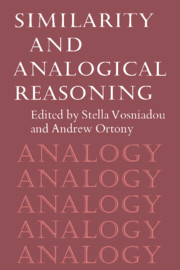Book contents
- Frontmatter
- Contents
- Preface
- List of contributors
- Similarity and analogical reasoning: a synthesis
- Part I Similarity and the structure of concepts
- Part II Analogical reasoning
- Part III Similarity and analogy in development, learning, and instruction
- 14 Analogical learning and transfer: What develops?
- 15 Analogical reasoning as a mechanism in knowledge acquisition: a developmental perspective
- 16 Remindings in learning and instruction
- 17 New approaches to instruction: because wisdom can't be told
- 18 Multiple analogies for complex concepts: antidotes for analogy-induced misconception in advanced knowledge acquisition
- 19 Comments on Part III: The activation and acquisition of knowledge
- Afterword: Comments on Parts I, II, and III: A framework for a theory of comparison and mapping
- Name index
- Subject index
16 - Remindings in learning and instruction
Published online by Cambridge University Press: 22 October 2009
- Frontmatter
- Contents
- Preface
- List of contributors
- Similarity and analogical reasoning: a synthesis
- Part I Similarity and the structure of concepts
- Part II Analogical reasoning
- Part III Similarity and analogy in development, learning, and instruction
- 14 Analogical learning and transfer: What develops?
- 15 Analogical reasoning as a mechanism in knowledge acquisition: a developmental perspective
- 16 Remindings in learning and instruction
- 17 New approaches to instruction: because wisdom can't be told
- 18 Multiple analogies for complex concepts: antidotes for analogy-induced misconception in advanced knowledge acquisition
- 19 Comments on Part III: The activation and acquisition of knowledge
- Afterword: Comments on Parts I, II, and III: A framework for a theory of comparison and mapping
- Name index
- Subject index
Summary
In learning a new cognitive skill, novices usually are required to solve many instructional examples. Under these circumstances, people often think back to an earlier example that the current problem reminds them of and use that earlier example and its solution to help them solve the current problem (e.g., Anderson, Farrell, & Sauers, 1984; Novick, 1986; Reed, Dempster, & Ettinger, 1985; Ross, 1984). This use of earlier examples has been suggested as a useful problemsolving heuristic (e.g., Polya, 1945; Wickelgren, 1974), and making analogies from earlier problems is considered by many researchers to be an important part of learning (e.g., Anderson, Farrell, & Sauers, 1984; Carbonell, 1983; Dellarosa, 1985; Gentner, 1980; Pirolli & Anderson, 1985; Reed et al., 1985; Ross, 1984; Winston, 1980).
My research in this area has focused on these remindings, their occurrence, their use, and their effects. Besides the effects that these remindings and their use may have on solving the current problem, they may be of interest for two additional reasons. First, as I will argue in more detail later, these remindings may affect performance not only on the current problem but on later problems as well. That is, remindings may affect what is learned. Second, the study of these relatively simple cases may provide particularly useful information about a number of important basic processes. Remindings may be useful not only because they occur and affect performance but also because they help us to examine similarity-based retrieval of relevant information, reconstruction, analogy, and generalization.
- Type
- Chapter
- Information
- Similarity and Analogical Reasoning , pp. 438 - 469Publisher: Cambridge University PressPrint publication year: 1989
- 52
- Cited by



